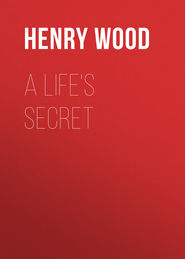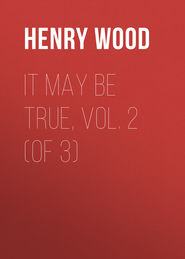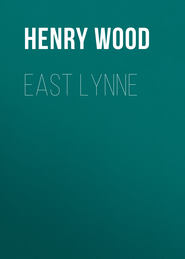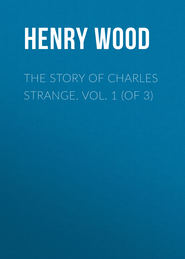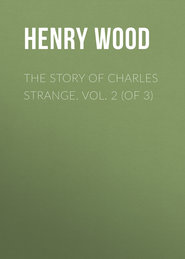По всем вопросам обращайтесь на: info@litportal.ru
(©) 2003-2024.
✖
Elster's Folly
Настройки чтения
Размер шрифта
Высота строк
Поля
"With my poor boy's death the chief difficulty has passed away. How things would have turned out, or what would have been done, had he lived, it has well-nigh worn away my brain to dwell upon. Carr knows that it has nearly killed me: my wife knows it."
"Yes, you could tell her things, and keep the diabolical secret from poor Maude and from me," she returned, rather inconsistently. "I don't doubt you and your wife have exulted enough over it."
"I never knew it until to-night," said Anne, gently turning to the dowager. "It has grieved me deeply. I shall never cease to feel for your daughter's wrongs; and it will only make me more tender and loving to her child. The world will never know that she is not Lady Maude."
"And the other name—Elster—because you know she has no right to it," was the spiteful retort. "I wish to my heart you had been drowned in your brother's place, Lord Hartledon; I wished it at the time."
"I know you did."
"You could not then have made fools of me and my dear daughter; and the darling little cherub in the churchyard would have been the real heir. There'd have been a good riddance of you."
"It might have been better for me in the long run," said he, quietly, passing over the inconsistencies of her speech. "Little peace or happiness have I had in living. Do not let us recriminate, Lady Kirton, or on some scores I might reproach you. Maude loved my brother, and you knew it; I loved Miss Ashton, and you knew that; yet from the very hour the breath was out of my brother's body you laid your plans and began your schemes upon me. I was weak as water in your hands, and fell into the snare. The marriage was your work entirely; and in the fruits it has brought forth there might arise a nice question, Lady Kirton, which of us is most to blame: I, who erred unwittingly, or you who—"
"Will you have done?" she cried.
"I have nearly done. I only wish you to remember that others may have been wrong, as well as myself. Dr. Ashton warned us that night that the marriage might not bring a blessing. Anne, it was a cruel wrong upon you," he added, impulsively turning to her; "you felt it bitterly, I shamefully; but, my dear wife, you have lived to see that it was in reality a mercy in disguise."
The countess-dowager, not finding words strong enough to express her feelings at this, made a grimace at him.
"Let us be friends, Lady Kirton! Let us join together silently in guarding Maude's good name, and in burying the past. In time perhaps even I may live it down. Not a human being knows of it except we who are here and Dr. Mair, who will for his own sake guard the secret. Maude was my wife always in the eyes of the world; and Maude certainly died so: all peace and respect to her memory! As for my share, retribution has held its heavy hand upon me; it is upon me still, Heaven knows. It was for Maude I suffered; for Maude I felt; and if my life could have repaired the wrong upon her, I would willingly have sacrificed it. Let us be friends: it may be to the interest of both."
He held out his hand, and the dowager did not repulse it. She had caught the word "interest."
"Now you might allow me Maude and that income!"
"I think I had better allow you the income without Maude."
"Eh? what?" cried the dowager, briskly. "Do you mean it?"
"Indeed I do. I have been thinking for some little time that you would be more comfortable in a home of your own, and I am willing to help you to one. I'll pay the rent of a nice little place in Ireland, and give you six hundred a-year, paid quarterly, and—yes—make you a yearly present of ten dozen of port wine."
Ah, the crafty man! The last item had a golden sound in it.
"Honour bright, Hartledon?"
"Honour bright! You shall never want for anything as long as you live. But you must not"—he seemed to search for his words—"you must undertake not to come here, upsetting and indulging the children."
"I'll undertake it. Good vintage, mind."
"The same that you have here."
The countess-dowager beamed. In the midst of her happiness—and it was what she had not felt for many a long day, for really the poor old creature had been put about sadly—she bethought herself of propriety. Melting into tears, she presently bewailed her exhaustion, and said she should like some tea: perhaps good Mr. Carr would bring her a teaspoonful of brandy to put into it.
They brought her hot tea, and Mr. Carr put the brandy into it, and Anne took it to her on the sofa, and administered it, her own tears overflowing. She was thinking what an awful blow this would have been to her own mother.
"Little Maude shall be very dear to me always, Val," she whispered. "This knowledge will make me doubly tender with her."
He laid his hand fondly upon her, giving her one of his sweet sad smiles in answer. She could at length understand what feelings, in regard to the children, had actuated him. But from henceforth he would be just to all alike; and Maude would receive her share of correction for her own good.
"I always said you did not give me back the letter," observed Mr. Carr, when they were alone together later, and Val sat tearing up the letter into innumerable bits.
"And I said I did, simply because I could not find it. You were right, Carr, as you always are."
"Not always. But I am sorry it came to light in this way."
"Sorry! it is the greatest boon that could have fallen on me. The secret is, so to say, off my mind now, and I can breathe as I have not breathed for years. If ever a heartfelt thanksgiving went up to Heaven one from me will ascend to-night. And the dowager does not feel the past a bit. She cared no more for Maude than for any one else. She can't care for any one. Don't think me harsh, Carr, in saying so."
"I am sure she does not feel it," emphatically assented Mr. Carr. "Had she felt it she would have been less noisy. Thank heaven for your sake, Hartledon, that the miserable past is over."
"And over more happily than I deserved."
A silence ensued, and Lord Hartledon flung the bits of paper carefully into the fire. Presently he looked up, a strange earnestness in his face.
"It is the custom of some of our cottagers here to hang up embossed cards at the foot of their bed, with texts of Scripture written on them. There is one verse I should like to hang before every son of mine, though I had ten of them, that it might meet their eyes last ere the evening's sleeping, in the morning's first awakening. The ninth verse of the eleventh chapter of Ecclesiastes."
"I don't remember," observed Thomas Carr, after a pause of thought.
"'Rejoice, O young man, in thy youth: and let thy heart cheer thee in the days of thy youth, and walk in the ways of thine heart, and in the sight of thine eyes: but know thou, that for all these things God will bring thee into judgment.'"
THE END
"Yes, you could tell her things, and keep the diabolical secret from poor Maude and from me," she returned, rather inconsistently. "I don't doubt you and your wife have exulted enough over it."
"I never knew it until to-night," said Anne, gently turning to the dowager. "It has grieved me deeply. I shall never cease to feel for your daughter's wrongs; and it will only make me more tender and loving to her child. The world will never know that she is not Lady Maude."
"And the other name—Elster—because you know she has no right to it," was the spiteful retort. "I wish to my heart you had been drowned in your brother's place, Lord Hartledon; I wished it at the time."
"I know you did."
"You could not then have made fools of me and my dear daughter; and the darling little cherub in the churchyard would have been the real heir. There'd have been a good riddance of you."
"It might have been better for me in the long run," said he, quietly, passing over the inconsistencies of her speech. "Little peace or happiness have I had in living. Do not let us recriminate, Lady Kirton, or on some scores I might reproach you. Maude loved my brother, and you knew it; I loved Miss Ashton, and you knew that; yet from the very hour the breath was out of my brother's body you laid your plans and began your schemes upon me. I was weak as water in your hands, and fell into the snare. The marriage was your work entirely; and in the fruits it has brought forth there might arise a nice question, Lady Kirton, which of us is most to blame: I, who erred unwittingly, or you who—"
"Will you have done?" she cried.
"I have nearly done. I only wish you to remember that others may have been wrong, as well as myself. Dr. Ashton warned us that night that the marriage might not bring a blessing. Anne, it was a cruel wrong upon you," he added, impulsively turning to her; "you felt it bitterly, I shamefully; but, my dear wife, you have lived to see that it was in reality a mercy in disguise."
The countess-dowager, not finding words strong enough to express her feelings at this, made a grimace at him.
"Let us be friends, Lady Kirton! Let us join together silently in guarding Maude's good name, and in burying the past. In time perhaps even I may live it down. Not a human being knows of it except we who are here and Dr. Mair, who will for his own sake guard the secret. Maude was my wife always in the eyes of the world; and Maude certainly died so: all peace and respect to her memory! As for my share, retribution has held its heavy hand upon me; it is upon me still, Heaven knows. It was for Maude I suffered; for Maude I felt; and if my life could have repaired the wrong upon her, I would willingly have sacrificed it. Let us be friends: it may be to the interest of both."
He held out his hand, and the dowager did not repulse it. She had caught the word "interest."
"Now you might allow me Maude and that income!"
"I think I had better allow you the income without Maude."
"Eh? what?" cried the dowager, briskly. "Do you mean it?"
"Indeed I do. I have been thinking for some little time that you would be more comfortable in a home of your own, and I am willing to help you to one. I'll pay the rent of a nice little place in Ireland, and give you six hundred a-year, paid quarterly, and—yes—make you a yearly present of ten dozen of port wine."
Ah, the crafty man! The last item had a golden sound in it.
"Honour bright, Hartledon?"
"Honour bright! You shall never want for anything as long as you live. But you must not"—he seemed to search for his words—"you must undertake not to come here, upsetting and indulging the children."
"I'll undertake it. Good vintage, mind."
"The same that you have here."
The countess-dowager beamed. In the midst of her happiness—and it was what she had not felt for many a long day, for really the poor old creature had been put about sadly—she bethought herself of propriety. Melting into tears, she presently bewailed her exhaustion, and said she should like some tea: perhaps good Mr. Carr would bring her a teaspoonful of brandy to put into it.
They brought her hot tea, and Mr. Carr put the brandy into it, and Anne took it to her on the sofa, and administered it, her own tears overflowing. She was thinking what an awful blow this would have been to her own mother.
"Little Maude shall be very dear to me always, Val," she whispered. "This knowledge will make me doubly tender with her."
He laid his hand fondly upon her, giving her one of his sweet sad smiles in answer. She could at length understand what feelings, in regard to the children, had actuated him. But from henceforth he would be just to all alike; and Maude would receive her share of correction for her own good.
"I always said you did not give me back the letter," observed Mr. Carr, when they were alone together later, and Val sat tearing up the letter into innumerable bits.
"And I said I did, simply because I could not find it. You were right, Carr, as you always are."
"Not always. But I am sorry it came to light in this way."
"Sorry! it is the greatest boon that could have fallen on me. The secret is, so to say, off my mind now, and I can breathe as I have not breathed for years. If ever a heartfelt thanksgiving went up to Heaven one from me will ascend to-night. And the dowager does not feel the past a bit. She cared no more for Maude than for any one else. She can't care for any one. Don't think me harsh, Carr, in saying so."
"I am sure she does not feel it," emphatically assented Mr. Carr. "Had she felt it she would have been less noisy. Thank heaven for your sake, Hartledon, that the miserable past is over."
"And over more happily than I deserved."
A silence ensued, and Lord Hartledon flung the bits of paper carefully into the fire. Presently he looked up, a strange earnestness in his face.
"It is the custom of some of our cottagers here to hang up embossed cards at the foot of their bed, with texts of Scripture written on them. There is one verse I should like to hang before every son of mine, though I had ten of them, that it might meet their eyes last ere the evening's sleeping, in the morning's first awakening. The ninth verse of the eleventh chapter of Ecclesiastes."
"I don't remember," observed Thomas Carr, after a pause of thought.
"'Rejoice, O young man, in thy youth: and let thy heart cheer thee in the days of thy youth, and walk in the ways of thine heart, and in the sight of thine eyes: but know thou, that for all these things God will bring thee into judgment.'"
THE END







